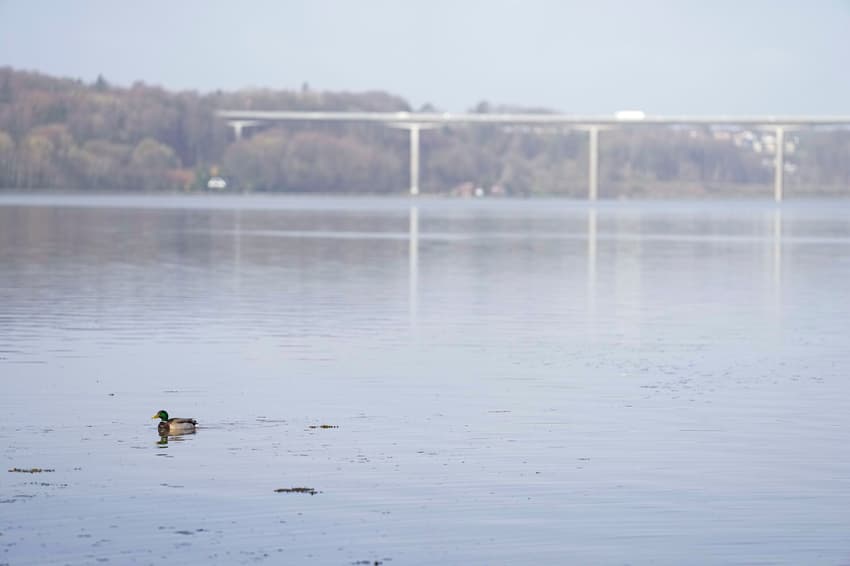Danish activists hold 'funeral' for polluted Vejle Fjord

A fjord on the east coast of Jutland received last rites on Saturday from a group of local activists in an effort to draw attention to the poor health of the country's coastal waters.
About a thousand people gathered alongside Vejle Fjord to celebrate an open-air "funeral" for the inlet, which has been asphyxiated by industrial agricultural run-offs.
"We mark this as a sorrowful event. Last year, we had the most heavy deoxygenation in 25 years in Denmark," Christian Fromberg, who organised the event for Greenpeace, told AFP in English.
Biologist Stiig Markager from the University of Aarhus said Vejle was a "dead fjord" because the lack of oxygen has killed off its fauna and flora.
"Thirty years ago we could catch fish here. Now there is nothing. The seabed is totally polluted. There is no life" said local resident Hugues Dedieu.
An underwater surveillance camera installed by a local town hall detected just one fish in 70 hours.
A report in 2022 by the University of Southern Denmark concluded the 22-kilometre (14-mile) fjord was in a "poor environmental condition" because of high levels of nitrogen run-off from fertiliser use on farms.
Intensive agriculture
Only five of Denmark's 109 coastal zones are classed as healthy.
"The culprits are pigs and cattle," said Markager.
"About 33 million pigs are produced every year and 64 percent of the land is cultivated.
The country's main agricultural association argues farmers are taking steps to prevent pollution.
"Danish farmers are constantly working to reduce nitrogen (use) and, as a result, nitrogen leaching has been halved since 1990," Marie Ostergaard from the Danish Agriculture and Food Council told AFP.
Denmark's agricultural industry would have to cut its nitrogen run-offs by another 45 percent in the following three years to conform with European Union-wide laws, Markager said.
Fertiliser run-off favours the growth of algae that cover water surfaces, blocking light and cutting off oxygen.
During the ceremony held on Saturday under ever-changing skies, participants read a series of homages to the fjord, interspersed with music.
Pastor Sarah Kragh Dedieu concluded the service with a Bible passage about the creation of the land and the sea.
"Denmark is most likely the member state in the EU with the worst ecological state of its waters," said Markager.
That's partly due to its geography.
Many of the country's estuaries have limited access to the open sea, which has a low salinity, he said.
Comments
See Also
About a thousand people gathered alongside Vejle Fjord to celebrate an open-air "funeral" for the inlet, which has been asphyxiated by industrial agricultural run-offs.
"We mark this as a sorrowful event. Last year, we had the most heavy deoxygenation in 25 years in Denmark," Christian Fromberg, who organised the event for Greenpeace, told AFP in English.
Biologist Stiig Markager from the University of Aarhus said Vejle was a "dead fjord" because the lack of oxygen has killed off its fauna and flora.
"Thirty years ago we could catch fish here. Now there is nothing. The seabed is totally polluted. There is no life" said local resident Hugues Dedieu.
An underwater surveillance camera installed by a local town hall detected just one fish in 70 hours.
A report in 2022 by the University of Southern Denmark concluded the 22-kilometre (14-mile) fjord was in a "poor environmental condition" because of high levels of nitrogen run-off from fertiliser use on farms.
Intensive agriculture
Only five of Denmark's 109 coastal zones are classed as healthy.
"The culprits are pigs and cattle," said Markager.
"About 33 million pigs are produced every year and 64 percent of the land is cultivated.
The country's main agricultural association argues farmers are taking steps to prevent pollution.
"Danish farmers are constantly working to reduce nitrogen (use) and, as a result, nitrogen leaching has been halved since 1990," Marie Ostergaard from the Danish Agriculture and Food Council told AFP.
Denmark's agricultural industry would have to cut its nitrogen run-offs by another 45 percent in the following three years to conform with European Union-wide laws, Markager said.
Fertiliser run-off favours the growth of algae that cover water surfaces, blocking light and cutting off oxygen.
During the ceremony held on Saturday under ever-changing skies, participants read a series of homages to the fjord, interspersed with music.
Pastor Sarah Kragh Dedieu concluded the service with a Bible passage about the creation of the land and the sea.
"Denmark is most likely the member state in the EU with the worst ecological state of its waters," said Markager.
That's partly due to its geography.
Many of the country's estuaries have limited access to the open sea, which has a low salinity, he said.
Join the conversation in our comments section below. Share your own views and experience and if you have a question or suggestion for our journalists then email us at [email protected].
Please keep comments civil, constructive and on topic – and make sure to read our terms of use before getting involved.
Please log in here to leave a comment.